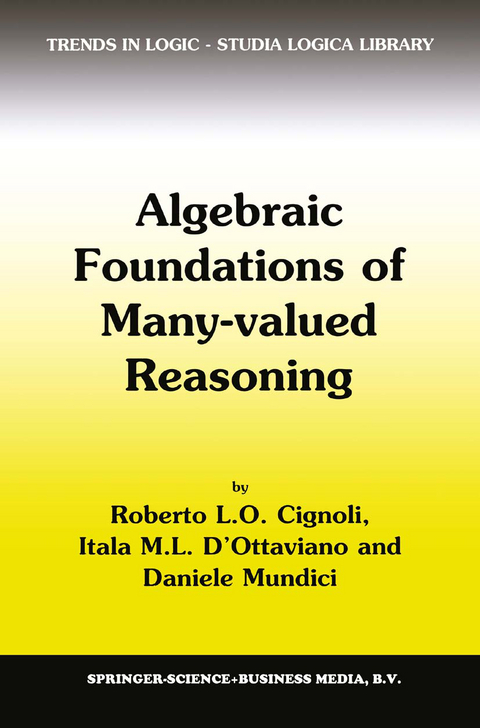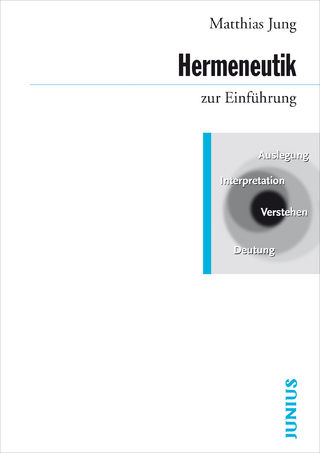
Algebraic Foundations of Many-Valued Reasoning
Seiten
1999
|
2000 ed.
Springer (Verlag)
978-0-7923-6009-4 (ISBN)
Springer (Verlag)
978-0-7923-6009-4 (ISBN)
States and proves various theorems of many-valued propositional logic. This text provides developments and trends, including applications to adaptive error-correcting binary search. It contains material, such as a simple proof of completeness theorem and of the equivalence between Chang's MV algebras and Abelian lattice-ordered groups with unit.
The aim of this book is to give self-contained proofs of all basic results concerning the infinite-valued proposition al calculus of Lukasiewicz and its algebras, Chang's MV -algebras. This book is for self-study: with the possible exception of Chapter 9 on advanced topics, the only prere- quisite for the reader is some acquaintance with classical propositional logic, and elementary algebra and topology. In this book it is not our aim to give an account of Lukasiewicz's motivations for adding new truth values: readers interested in this topic will find appropriate references in Chapter 10. Also, we shall not explain why Lukasiewicz infinite-valued propositionallogic is a ba- sic ingredient of any logical treatment of imprecise notions: Hajek's book in this series on Trends in Logic contains the most authorita- tive explanations. However, in order to show that MV-algebras stand to infinite-valued logic as boolean algebras stand to two-valued logic, we shall devote Chapter 5 to Ulam's game of Twenty Questions with lies/errors, as a natural context where infinite-valued propositions, con- nectives and inferences are used.
While several other semantics for infinite-valued logic are known in the literature-notably Giles' game- theoretic semantics based on subjective probabilities-still the transi- tion from two-valued to many-valued propositonallogic can hardly be modelled by anything simpler than the transformation of the familiar game of Twenty Questions into Ulam game with lies/errors.
The aim of this book is to give self-contained proofs of all basic results concerning the infinite-valued proposition al calculus of Lukasiewicz and its algebras, Chang's MV -algebras. This book is for self-study: with the possible exception of Chapter 9 on advanced topics, the only prere- quisite for the reader is some acquaintance with classical propositional logic, and elementary algebra and topology. In this book it is not our aim to give an account of Lukasiewicz's motivations for adding new truth values: readers interested in this topic will find appropriate references in Chapter 10. Also, we shall not explain why Lukasiewicz infinite-valued propositionallogic is a ba- sic ingredient of any logical treatment of imprecise notions: Hajek's book in this series on Trends in Logic contains the most authorita- tive explanations. However, in order to show that MV-algebras stand to infinite-valued logic as boolean algebras stand to two-valued logic, we shall devote Chapter 5 to Ulam's game of Twenty Questions with lies/errors, as a natural context where infinite-valued propositions, con- nectives and inferences are used.
While several other semantics for infinite-valued logic are known in the literature-notably Giles' game- theoretic semantics based on subjective probabilities-still the transi- tion from two-valued to many-valued propositonallogic can hardly be modelled by anything simpler than the transformation of the familiar game of Twenty Questions into Ulam game with lies/errors.
1 Basic notions.- 2 Chang completeness theorem.- 3 Free MV-algebras.- 4 ?ukasiewicz ?-valued calculus.- 5 Ulam’s game.- 6 Lattice-theoretical properties.- 7 MV-algebras and ?-groups.- 8 Varieties of MV-algebras.- 9 Advanced topics.- 10 Further Readings.
| Reihe/Serie | Trends in Logic ; 7 |
|---|---|
| Zusatzinfo | 1 Illustrations, black and white; IX, 233 p. 1 illus. |
| Verlagsort | Dordrecht |
| Sprache | englisch |
| Maße | 155 x 235 mm |
| Themenwelt | Geisteswissenschaften ► Philosophie ► Allgemeines / Lexika |
| Mathematik / Informatik ► Mathematik ► Allgemeines / Lexika | |
| Mathematik / Informatik ► Mathematik ► Logik / Mengenlehre | |
| ISBN-10 | 0-7923-6009-5 / 0792360095 |
| ISBN-13 | 978-0-7923-6009-4 / 9780792360094 |
| Zustand | Neuware |
| Informationen gemäß Produktsicherheitsverordnung (GPSR) | |
| Haben Sie eine Frage zum Produkt? |
Mehr entdecken
aus dem Bereich
aus dem Bereich
die letzten Jahre der Philosophie und der Beginn einer neuen …
Buch | Hardcover (2024)
Klett-Cotta (Verlag)
CHF 39,20
Konfuzianismus, Daoismus, Buddhismus
Buch | Softcover (2023)
C.H.Beck (Verlag)
CHF 25,20


